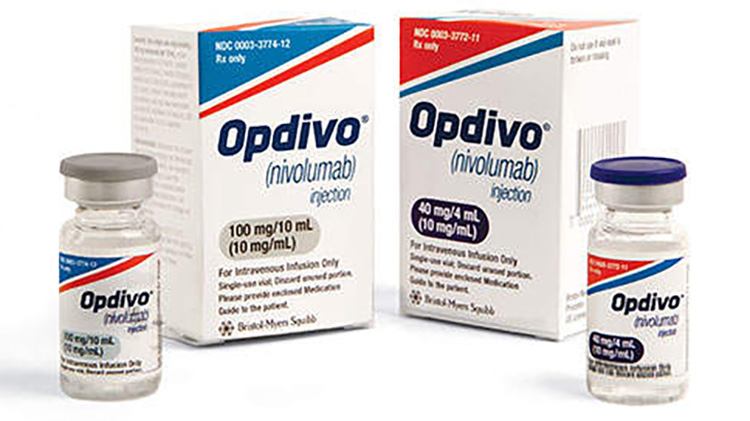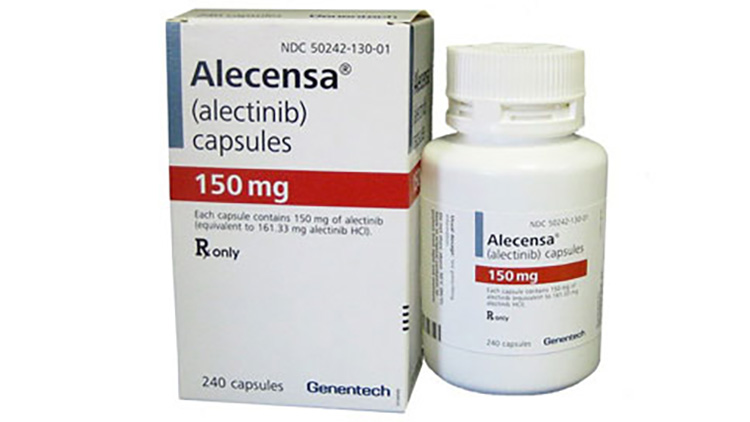Opdivo (Nivolumab) vs Alecensa (alectinib)
Opdivo (Nivolumab) vs Alecensa (alectinib)
Opdivo (Nivolumab) is an immune checkpoint inhibitor specifically targeting PD-1, used primarily to treat various forms of cancer, including melanoma, lung cancer, and kidney cancer, by enhancing the body's immune response against cancer cells. Alecensa (alectinib), on the other hand, is a tyrosine kinase inhibitor that targets the ALK protein and is used in the treatment of non-small cell lung cancer (NSCLC) in patients who have an abnormal ALK gene. The choice between Opdivo and Alecensa would largely depend on the specific type of cancer a patient has and the presence of certain genetic mutations; therefore, a healthcare provider would recommend the appropriate medication based on the patient's unique cancer profile and treatment history.
Difference between Opdivo and Alecensa
| Metric | Opdivo (Nivolumab) | Alecensa (alectinib) |
|---|---|---|
| Generic name | Nivolumab | Alectinib |
| Indications | Metastatic melanoma, non-small cell lung cancer (NSCLC), renal cell carcinoma, classical Hodgkin lymphoma, urothelial carcinoma, colorectal cancer, hepatocellular carcinoma, esophageal squamous cell carcinoma, malignant pleural mesothelioma | ALK-positive non-small cell lung cancer (NSCLC) |
| Mechanism of action | Programmed death receptor-1 (PD-1) blocking antibody | ALK inhibitor |
| Brand names | Opdivo | Alecensa |
| Administrative route | Intravenous infusion | Oral |
| Side effects | Fatigue, rash, musculoskeletal pain, pruritus, diarrhea, nausea, decreased appetite, cough, dyspnea, constipation, vomiting, and pyrexia | Constipation, fatigue, edema, myalgia, anemia, elevated liver enzymes, diarrhea, nausea, weight gain, cough |
| Contraindications | Hypersensitivity to nivolumab or any of its excipients | Hypersensitivity to alectinib or any of its excipients |
| Drug class | Immune checkpoint inhibitor | Tyrosine kinase inhibitor |
| Manufacturer | Bristol Myers Squibb | Genentech (a member of the Roche Group) |
Efficacy
Opdivo (Nivolumab) in Lung Cancer Treatment
Opdivo, also known by its generic name Nivolumab, is a medication that is part of a class of drugs known as PD-1 inhibitors. It is used in the treatment of various forms of cancer, including lung cancer. Specifically, Opdivo has shown efficacy in treating non-small cell lung cancer (NSCLC), which is the most common type of lung cancer. Clinical trials have demonstrated that Opdivo can significantly improve survival rates in patients with NSCLC, particularly in those who have previously been treated with chemotherapy. Opdivo works by blocking the PD-1 protein on immune cells, thereby enhancing the immune system's ability to detect and destroy cancer cells.
The efficacy of Opdivo in lung cancer treatment has been evaluated in several studies. For instance, the CheckMate-057 trial reported improved overall survival in patients with advanced NSCLC who were treated with Opdivo compared to those who received docetaxel, a standard chemotherapy drug. Additionally, Opdivo has been shown to have a durable response, meaning that the effects of the treatment can last for an extended period after the completion of the therapy.
Alecensa (Alectinib) in Lung Cancer Management
Alecensa, with the generic name alectinib, is an oral medication used to treat NSCLC as well, particularly in patients who have an abnormal anaplastic lymphoma kinase (ALK) gene. Alectinib is a tyrosine kinase inhibitor that targets the ALK fusion protein, which can contribute to the development and growth of cancer cells. Alecensa has been found to be highly effective in patients with ALK-positive NSCLC, offering an important treatment option for this subset of lung cancer patients.
The efficacy of Alecensa in treating ALK-positive NSCLC has been supported by clinical trials, such as the ALEX trial, which showed that Alecensa not only provided a longer progression-free survival compared to crizotinib (another ALK inhibitor) but also had a more favorable safety profile. Additionally, Alecensa has demonstrated effectiveness in controlling central nervous system metastases, which is a common complication in ALK-positive NSCLC patients. This ability to cross the blood-brain barrier and act on brain metastases is a significant advantage in the management of lung cancer.
Regulatory Agency Approvals
Opdivo
-
European Medical Agency (EMA), European Union

-
Food and Drug Administration (FDA), USA

-
Health Canada

-
Pharmaceuticals and Medical Devices Agency (PMDA), Japan

-
Therapeutic Goods Administration (TGA), Australia

-
Medsafe (NZ)

Alecensa
-
European Medical Agency (EMA), European Union

-
Food and Drug Administration (FDA), USA

-
Health Canada

-
Pharmaceuticals and Medical Devices Agency (PMDA), Japan

-
Therapeutic Goods Administration (TGA), Australia

-
Medsafe (NZ)

Access Opdivo or Alecensa today
If Opdivo or Alecensa are not approved or available in your country (e.g. due to supply issues), you can access them via Everyone.org.
How it works

Make an enquiry
Choose the medicine you want to buy, answer a couple of questions, and upload your prescription to speed things up. We’ll get back to you within 24 hours.


Make an enquiry
Choose the medicine you want to buy, answer a couple of questions, and upload your prescription to speed things up. We’ll get back to you within 24 hours.


Breeze through the paperwork
We'll guide you through the required documents for importing unapproved medicine, ensuring you have all the necessary information.


Get a personalized quote
We’ll prepare a quote for you, including medicine costs and any shipping, administrative, or import fees that may apply.


Receive your medicine
Accept the quote and we’ll handle the rest - sourcing and safely delivering your medicine.

Some text on this page has been automatically generated. Speak to your physician before you start a new treatment or medication.
Let's talk
If you have any questions, call us or send us a message through WhatsApp or email:
Contact us




